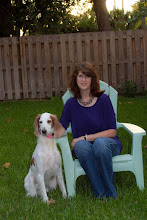Party at Sanditon began as
the dialogue among a group of dead addicts at a party who had tried to live in
recovery and failed. The letters I have from the real-life individual who was
the model for this story were to be part of the dialogue.
Obviously this
was a painful process, so after writing the introductory notes, this cathartic
piece was the truest and clearest tribute that I could write to my dear friend
who died.
Leif died when he was thirty. This year he would have
been thirty-six. I knew him as a baby. He was an adorable child.
He was an adorable adult. He was an addict and a liar,
and his life was a mess. He was a beautiful spirit and a horrible object
lesson. He was manipulative but not mean-spirited. He was as simple as a child
at times, but you could never, and would never trust him to tell you the truth.
He was an angel. He loved fishing and dogs and simple
pleasures. Actually, he was not an angel; he was as beautiful and talented as
an archangel when he blew on his horn. He could also cook, and he was a whiz on
computers, yet he blew it. He blew his life away for nothing, really.
That is the truth. Drugs lead nowhere, and life
becomes meaningless. I tried to help him so many times. There were episodes at
the methadone clinic that I remember as if they happened yesterday.
We spoke to the counselor at the clinic, and the
counselor was honest and forthright. I was there when he was told to his face
that he would never live past thirty if he didn’t change his ways. I also wrote
to him in jail, when he was arrested for the second or third time, I don’t
remember which.
He was ostracized by many, but still managed to sound
very chipper when you spoke with him on the phone. He was so interested and so
interesting in so many ways. There were any number of sports that intrigued
him, and there was a love of history. He loved the Civil War, and we spoke of
it many times.
He loved to read, and he loved not to just cook, but
to prepare food. He was quite a chef. There were so many interests and pastimes
to reel him in. He loved movies, and we went together often. But in the end,
are life’s small quandaries and sideshows ever enough for some?
A favorite quote of mine—I believe it was from a
biography of Montgomery Clift—was this: “All we could do was hold his hand as
he walked to the grave.” I am holding hands a lot these days. The older we get,
the more hand-holding we do. I held Leif’s hand, too.
It’s not because you’ve “given up” on somebody—you
never, never, never, never give up,
to misquote Churchill. You keep fighting; you keep trying, but—
The older you get, not the wiser you get, but the
wiser you get about not being fooled by human nature. History will repeat
itself, the cycle will turn, yet you try and you try, and you know you will
fail A LOT!
Sometimes you will fail in life. Sometimes you will
fail big. That is something they don’t tell you as a child. And you need to
know this fact even as a baby coming out of the womb. It is part of life. Part of life is trying and failing, failing
badly sometimes, yet we keep trying—always.
There are those who are searching. And there are those who are never satisfied
with what they’ve found. He was one of those. Something drew him into that
darker point on the horizon. I cannot see this point now, but I know it exists.
When someone dies, and death is not expected, there is
always one word that pops up, why?
That question is so cliché and so tres chic and so banal and so hard to answer.
There is no why in death (death is
the period), but there is always someone who is left on the other side of the
question.
Why do I care so many years later? What draws any of
us to a darker place during our time on earth? There is here, and there is now,
and some have no God to latch onto.
My God is not a judgmental character, and he knows no
reason or logic may comfort me. I thank him for that. He will comfort me at
times, even against all reason. But we
two cannot expand the circle just yet. I
concede that there is a circle of love and trust and hope that is found within
our family.
And then there is a circle of my life that is a
wellspring, and it is found solely within me. I acknowledge after these many
years that we cannot bring comfort to the dead, but only know the comfort we
extend to the living. That is our curse and our blessing.
I find comfort in knowing him. There is something of
our God in the dead that we love. We see things that we could never recognize
before and appreciate the person, long gone, as a spirit that we never could
truly know while they lived. That is our blessing and our curse.

